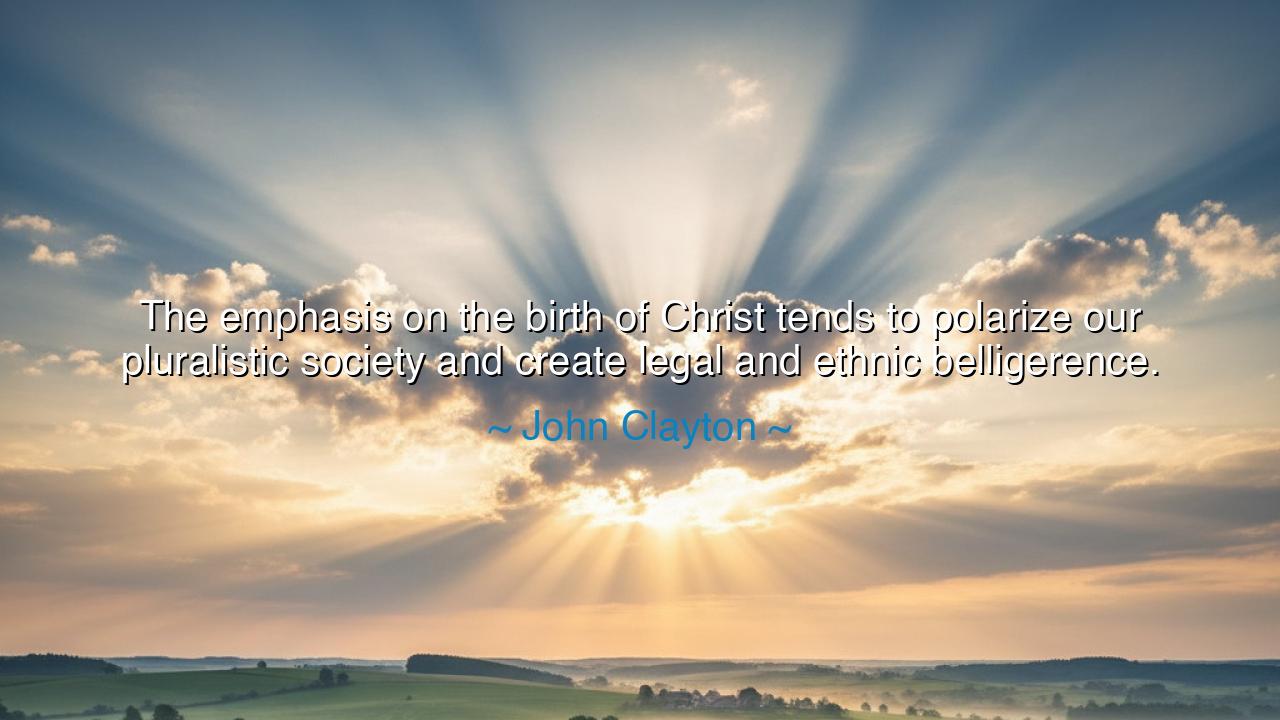
The emphasis on the birth of Christ tends to polarize our
The emphasis on the birth of Christ tends to polarize our pluralistic society and create legal and ethnic belligerence.






Hear, O seekers of understanding, the sober words of John Clayton: “The emphasis on the birth of Christ tends to polarize our pluralistic society and create legal and ethnic belligerence.” These words do not diminish the sacredness of Christ’s birth, but warn us of a danger that arises when one holy truth is lifted above all others in a land of many voices. For the human heart, though it yearns for unity, often hardens into division when its cherished beliefs are challenged or overshadowed. Thus, in a pluralistic society, the danger is not in faith itself, but in the way faith is wielded—as a banner that separates rather than a light that unites.
From the ancient days, men have fought not only with swords but with beliefs. Religion, the source of comfort and purpose, has also been the cause of conflict and strife. When one people exalted their god above all others and demanded the same devotion of their neighbors, wars ignited and empires trembled. Clayton’s words echo this pattern: that even a message as joyous as the birth of Christ, when emphasized in a way that excludes, can awaken resentment among those who walk a different path. The very event meant to herald peace on earth may, through human frailty, become a spark for discord.
Consider the tale of the Thirty Years’ War in Europe, where Catholic and Protestant princes fought bitterly, not merely for power but for the supremacy of their faiths. Cities burned, nations wept, and millions perished, not because God Himself commanded hatred, but because men hardened their hearts against their neighbors. So too, in our modern times, when one tradition is lifted above others in the public square, it can sow seeds of belligerence, not peace. The lesson of history reminds us: devotion must never become domination, lest faith itself be turned into a weapon.
Yet the ancients also teach: it is not the holy day that divides, but the spirit in which it is observed. The birth of Christ is a celebration of love, humility, and the gift of hope. But when it is proclaimed in a way that excludes the Jew, the Muslim, the Hindu, the skeptic, or the unbeliever, it ceases to be a light to the nations and becomes a wall between them. True reverence for the sacred birth is not found in legal decrees or cultural battles, but in living its spirit—feeding the hungry, sheltering the homeless, offering kindness to the stranger.
Clayton’s words call us to discernment. In a world of many peoples and many beliefs, we must learn to honor our faith without dishonoring others. To emphasize only our own story is to forget that others, too, have stories that shape their souls. If we truly believe in the greatness of our faith, we must embody it through compassion, not compulsion; through welcome, not exclusion. Thus does faith become not a source of division, but a bridge across differences.
The lesson, then, is this: remember that faith is most powerful when it humbles, not when it conquers. Celebrate the birth of Christ as a fountain of love, but do not let that celebration become a hammer that strikes others. Instead, allow it to inspire deeds that transcend boundaries, so that even those who do not share your creed may see the goodness it bears. In doing so, you honor not only your faith, but the dignity of all.
Practical action lies before you: when you celebrate your holy days, invite others in the spirit of fellowship, not in expectation of conversion. When you speak of your faith, do so with gentleness, not pride. When debates arise in the courts and public squares, remember that peace is greater than victory, and unity more enduring than triumph. Thus shall you turn potential belligerence into harmony, and division into understanding.
So let it be remembered: the power of Christ’s birth, or any sacred moment, lies not in the force of its proclamation, but in the depth of its love. If you wield it with humility, it becomes light to the world. If you wield it with pride, it becomes a blade that cuts the bonds of community. Choose, therefore, to make it a lamp for peace, and future generations shall bless your wisdom.






AAdministratorAdministrator
Welcome, honored guests. Please leave a comment, we will respond soon